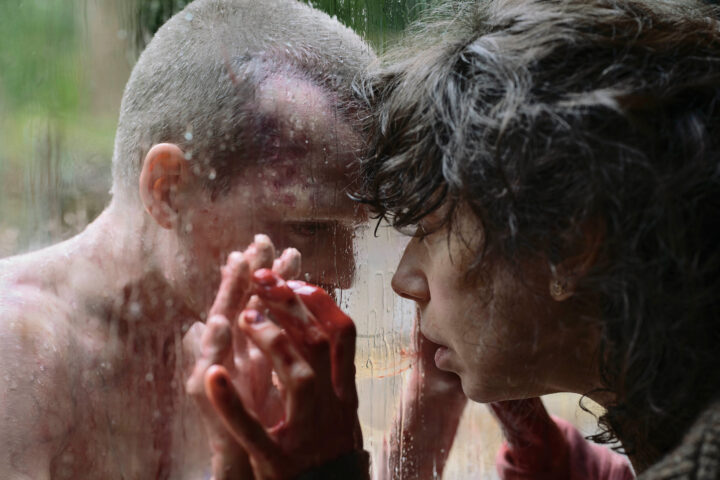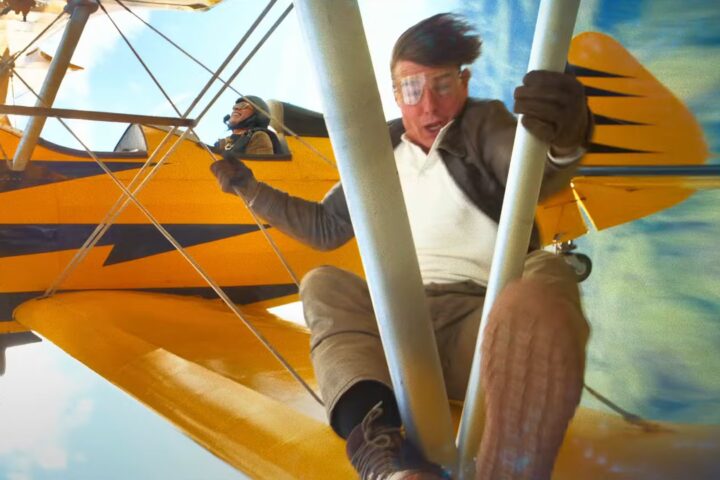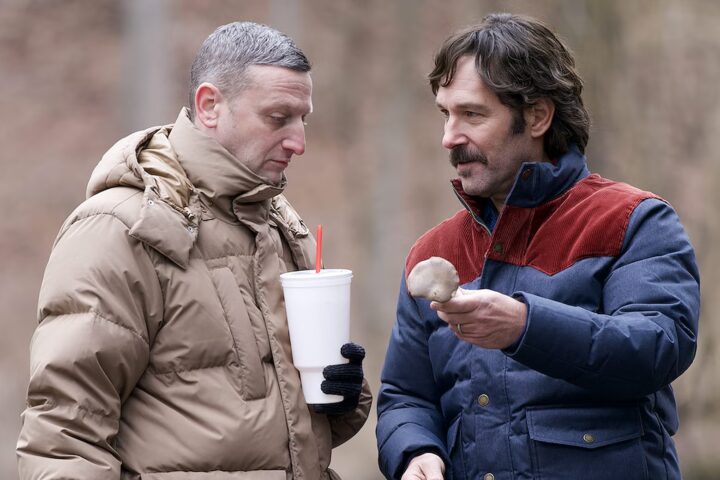It is, to put it charitably, a formula.
There’s this Small-Town Kid from a working-class background who, despite a lack of know-how or means has Very Big Dreams, and while no one Believes In Her, just maybe, with the help of a Unlikely Mentor, who appears out of nowhere and needs a little redemption of his/her own, she’ll get her shot. Along the way, a Major Opportunity that could pave the way to success will be blown. Seemingly, all will be lost (necessitating a return to the Dreary Job). People close to her will be skeptical, even discouraging, but they’ll eventually come around (and usually cheer in front of a small TV set). And then, finally, by the grace of God (or the miracle of movie clichés), doubters will be Won Over, and she will overcome all obstacles at the Big Competition.
That might be a cynic’s take—but not mine—on the pretty much delightful music saga Teen Spirit, which stars a sensational Elle Fanning as a shy teen hitching her hopes on a British TV singing competition of the same name. It’s a sweet, enjoyable movie that admittedly offers nothing new, yet somehow manages to considerably engage us with a formula that works because, well, it always does.
Violet Valenski (Fanning) lives in a world commonly portrayed in the movies as one from which to escape, here England’s rural, south coast Isle of Wight, where her life is a predictable routine in which nothing ever happens. The daughter of a hardworking, single, Polish immigrant mother (Agnieszka Grochowska), Violet waits tables at the local dive restaurant, contributing her wages to the household. It’s been a good while since her father up and left, and like immigrants anywhere, her mother’s philosophy is work comes first—even if you’re vomiting with the flu.
When she’s not working, Violet bails hay and hangs out with her best friend, a horse, who seems to understand her more than her vapid classmates, and entertains the chaste flirtations of a local boy (Archie Madekwe) who fronts his own rock band.
Violet keeps a full-time high school schedule before her evening shift, clocking out early to catch a late night bus across town (naturally) to do the one thing that makes her happy—sing on an open mic night (in an even more depressing dive bar) for a handful of distracted, drunken patrons.
Enter broken down former opera star Vlad (Croatian-Danish actor Zlatko Burić), the only one in the bar who recognizes Violet’s talent. She initially rejects his offer of a ride home, but soon calls upon him for a different favor. Smart enough to know her singing will meet with her mother’s disapproval, she enlists him as a stand-in guardian for her first-round Teen Spirit audition. He agrees, but only if she’ll take him on as her vocal coach and manager at a 50% take (a percentage her mother later radically reduces).
Unsurprisingly, the unlikely duo makes it through several audition rounds (cue the opening strains of Irene Cara’s hit Flashdance… What a Feeling at one key juncture—not kidding) and to the big event. But will Violet be derailed by the affections of last year’s big winner (Ruairi O’Connor)? Or will she sell out, sign a record deal from an anxious label exec (played by a sly Rebecca Hall) and leave her mentor behind?
That is as high as the Teen Spirit stakes get, but no matter. Minghella ticks off the expected boxes as shy Violet is first mocked at by her trendier friends, who also enter the competition, but later becomes a local celebrity in her tiny corner of the world. A charming scene involves the well wishes of the church congregation to their “angel,” and Minghella handles the local flavor with care, not exaggeration.
It’s been a renaissance moment for actresses in movie musical dramas, from Lady Gaga’s galvanizing turn in A Star is Born to Cold War’s haunting Joanna Kulig and Natalie Portman’s on the ropes pop star in Vox Lux. And now we have the endearing Fanning, whose young face here suppresses the star’s lovely smile in favor of a marked lack of optimism. Her Violet doesn’t seem to enjoy life much and always seems to be working through something major, just under the surface. We are never quite certain from where her passion’s origins come, and while performing, she doesn’t exactly seem liberated, or all that much like the “butterfly” she’s poised, by one character, to become. She’s something of an enigma.
So what is it then, that makes her, in her best moments, so compelling? I’d say because Fanning projects sincere vulnerability and empathy, and that informs the entire film. Her final onstage moment (and another backstage) has an undeniable emotional catharsis. She’s that likable. When she sings, it’s a thrill for her Violet and for us. And her singing voice, a product of intense vocal training preparation, sounds terrific. In performance here she channels the pop stylings of Robyn, Ellie Goulding and even Annie Lennox, but offstage she is as naturalistic as actresses come.
Usually a recessive performer who doesn’t so much “act” and always (sometimes frustratingly) underplays, she does so this time to appealing, delicate effect, finally finding a killer role to match her subtle gifts. In Teen Spirit she surprises with a convincing Polish accent, throaty singing voice and a quiet angst, which hangs on her face through most of the movie as if she’s been taught her whole life to be disappointed.
Aside from Fanning, the growing relationship between Violet and Vlad is the best thing in the movie. And while Teen Spirit is smart enough not to connect all of its backstory dots—we’re aware that Vlad is a former alcoholic in serious career decline with familial alienation—it presents an obvious symmetry between a father with his own absent daughter, and a fatherless daughter needing him to play that role. Throughout, the kindness flowing between them supersedes narrative familiarity, even while Minghella slightly overreaches in suggesting stirrings between mother and manager.
Teen Spirit doesn’t commit to much more. There’s no rags-to-riches arc. It isn’t about what it takes to be a pop star today, or imposition of celebrity image on young, female singers. And it isn’t about the music industry machine of recording contracts and packaging. It also isn’t about a driving passion to make it, or Violet’s love of performing, though she certainly “likes,” it, as she says at one key moment. And while it has one brief scene of vocal training (“the more space to have to breathe, the more you have to sing”), it isn’t truly about the regimen of transforming raw talent into a winner.
What it’s most about is trust and loyalty and family reunification, all effectively undersold, and how the strength of those elements can trump the lure of selling out. Minghella knows this story sells itself, so he doesn’t push it. It may be lockstep, but it largely avoids the hoariness of lesser, similar films.
I was glad to have met Violet Valenski. You will be too.
3 stars.



